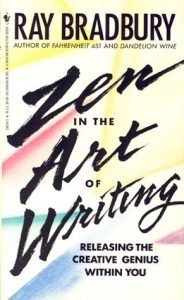A news item in a CNN email series that I subscribe to announced on September 19, 2018, that Merriam-Webster has added 840 words to their dictionary. In a prepared statement, the publisher noted that, “The addition of new words to a dictionary is a step in the continuous process of recording our ever-expanding language. The dictionary’s job is to report that usage as it enters the general vocabulary.”
Translation: “Because Americans are too lazy to use real language, and too offended not to be included, we’ll make them feel better by putting their disgustingly stupid non-words in our book.” Continue reading “Oh Boy, New “Words””
 By Ray Bradbury
By Ray Bradbury
